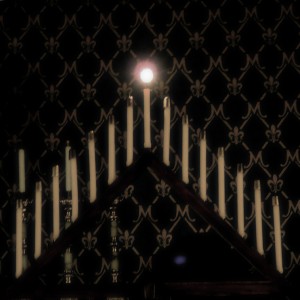 For parishioners who maybe are new to our parish, or new to the Traditional Latin mass and its related liturgical traditions, or even if you have been a parishioner for awhile but never ventured to attend Tenebrae, I thought I would post a little about it and encourage you to attend.
For parishioners who maybe are new to our parish, or new to the Traditional Latin mass and its related liturgical traditions, or even if you have been a parishioner for awhile but never ventured to attend Tenebrae, I thought I would post a little about it and encourage you to attend.
What it is:
Tenebrae means “darkness” or “shadows”, and it refers to the chanting of matins/lauds of the Divine Office on the 3 days leading up to Easter Sunday: Holy Thursday, Good Friday, and Holy Saturday.
Usually, in religious orders, this part of the office should be chanted when it is still dark outside, and sung by the light of candles only. In the earliest centuries, it was chanted shortly after midnight, but starting in the middle ages, it became the common practice to chant it on the evening before in anticipation, to make it more widely accessible to clergy and laity.
So following this tradition of making it available for parishioners in a parish setting, we chant it on the previous night. That means on Wednesday night (tomorrow), we will chant the Matins/Lauds of Holy Thursday, and on Friday night, we chant the matins/lauds of Holy Saturday. Since we have the Maundy Thursday mass in the evening, we do not chant the Tenebrae service of Good Friday.
What to Expect:
The choir sits in the front pews of the nave, women/men on separate sides, and we alternate chanting the verses of the psalms. The priests attend “in choir” in the sanctuary, and chant the lessons that separate the psalms during Matins. There is a candle “hearse” at the front, shaped like a triangle, with 15 candles. As each psalm is completed, 1 candle is extinguished, until only the lone candle at the top is left; personally, I have found this to be a powerful reminder of the apostles abandoning Christ in his darkest hour. The candles on the high altar are extinguished while the Benedictus is chanted, and then the famous “Christus Factus est” chant is sung at the end, while the candle representing Christ is hidden, so there is total darkness. Then, traditionally, a “loud noise/commotion” (the strepitus) is made, represents the convulsion of nature following the death of Christ; the chaos of the world without a savior. This is done usually by banging books on the pews for several seconds, until the “Christ candle” is returned to view again. Then all commotion ceases. And all depart in silence & darkness.
Personally, I wanted to urge you to consider coming if you haven’t before, and experience this deeply moving, and prayerful part of Holy Week at Mater Dei. When I first encountered Tenebrae, I was struck by its intensity to help lay faithful enter into Holy Week with a greater degree of contemplation. It is like a mini religious retreat for lay people. And so I made it one of my first priorities to make the richness of Tenebrae available to my fellow parishioners at Mater Dei. It has also become the most treasured part of Holy Week for many members of the choir as well.
This year, on Friday evening, the Schola Marianum members will also sing Victoria’s polyphonic settings of the responsories between the lessons during matins. They are hauntingly beautiful, and add “a little extra” to this last evening of Tenebrae.
When you come, there will be Tenebrae booklets available near the doors, for you to follow along with the choir, and meditate on the psalms/readings. If booklets become scarce, don’t worry! You can also find the service of Tenebrae in Latin/English toward the back of the missals that are at the ends of all the pews. It likely will be located somewhere after the Masses for the Dead.
If you cannot attend, especially because you have little ones to take care of, we are attempting this year, for the first time, to make a live recording of the two evenings of Tenebrae. We shall see how it turns out! My hope is to make these audio files available on the parish website, so that more parishioners can experience Tenebrae, even from the comfort of their own home, and possibly as digital download files in companion to the choir’s Holy Week CD, “Lux in Tenebris”.
More posts to come, on the music schedule for the Holy Week liturgies.
God Bless your Holy Week,
Kimberly Walters